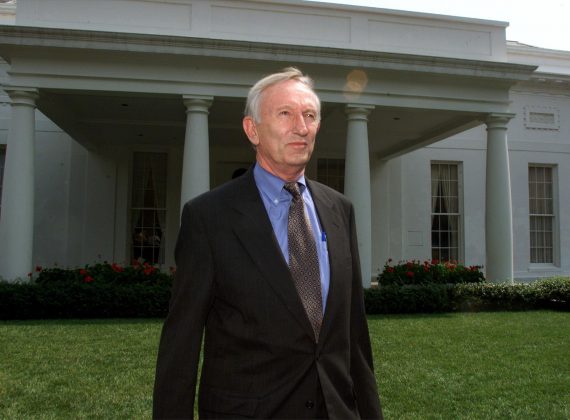James Jeffords, Former Vermont Senator, Dies At 80
James Jeffords, who represented Vermont as a Congressman and Senator for a combined total of more than 30 years but became famous, or infamous depending on your point of view, when he left the GOP to caucus with Democrats as an Independent, has died at the age of 80:
MONTPELIER, Vt. — Former Vermont U.S. Sen. James Jeffords, who in 2001 tipped control of the Senate when he quit the Republican Party to become an independent, died Monday. He was 80.
Jeffords died in Washington, said Diane Derby, a former aide to Jeffords. He had been in declining health, she said.
Jeffords had announced in 2005 that he would not seek a fourth term, citing his and his wife’s health problems.
“I have had an enormously satisfying career, one that I would not have traded for any other,” Jeffords said when he retired. “In no other job do you have both the freedom and obligation to solve problems and help people on a daily basis.”
In a statement, President Barack Obama said Jeffords devoted his life to public service.
“During his more than 30 years in Washington, Jim never lost the fiercely independent spirit that made Vermonters, and people across America, trust and respect him,” Obama said.
Vermont’s sole congressman, Bernie Sanders, was elected to Jeffords’ Senate seat in 2006.
U.S. Sen. Patrick Leahy, D-Vt., said Monday that Jeffords was a partner and friend who worked for Vermont.
“He was a Vermonter through and through, drawn to political life to make a difference for our state and nation,” Leahy said. “Part of his legacy will also stand as an enduring chapter of the Senate’s history.”
Jeffords served more than 30 years in Washington. He won election to the House in 1974 as a Republican. The post-Watergate year was a strong one for Democrats nationally, but Jeffords was running as Vermont was just beginning its shift from a century of solid Republicanism to its current status as among the most liberal states.
The Rutland native, a graduate of Yale and Harvard Law School, already had won statewide office as attorney general and was from a well-known Vermont Republican family. His father, Olin Jeffords, had been chief justice of the state Supreme Court.
(…)
During his time in Washington, Jeffords stood out as a moderate to liberal Republican during a time when the party was moving to the right. He was a strong backer of education, the environment, job training and help for people with disabilities.
He was the only Republican in the House to vote against President Ronald Reagan’s tax cuts in 1981. After election to the Senate in 1988, replacing another moderate Republican, Robert Stafford, Jeffords opposed the first President Bush’s appointment of Clarence Thomas to the U.S. Supreme Court.
A decade later, when Republicans had gained control of both the White House and both houses of Congress, Jeffords, upset with President George W. Bush’s opposition to the Individuals With Disabilities Education Act, decided that was the last straw. In May of 2001, he declared he would leave the Republicans and caucus with the Democrats.
Republicans were apoplectic, particularly since Jeffords’ switch cost them control of the closely divided Senate. GOP Leader Trent Lott of Mississippi dubbed Jeffords’ action a “coup of one,” and described it as “the impetuous decision of one man to undermine our democracy.”
“In 2001, he displayed enormous courage by leaving a party that, he often said, had left him because of its dramatic move to the right,” Sanders, a left-leaning independent, said Monday.
Former Sen. Tom Daschle, D-S.D., who ascended from minority to majority leader after Jeffords made his switch, said that Jeffords “was under enormous pressure not to make the change.” Daschle said.
President George W. Bush, Vice President Dick Cheney, Senate GOP leaders and senators, and political supporters in Vermont “all brought pressure to bear, and they did it collectively and in a very concerted way,” Daschle said.
At the heart of Jeffords’ decision was a belief that Republicans in general and President Bush in particular had become too conservative and that he could not remain in a party that favored tax breaks for the wealthy over full funding of education programs for the disabled.
He complained at the time that the Republicans in control of both the White House and Congress “were set out on an agenda that did not fit into what the average American wanted to see.”
The Democrats’ control of the Senate was brief. Republicans took it back 18 months later, and added to their gains the 2004 elections. But Democrats regained Senate control in 2006.
Jeffords became a hero to Democrats, attracting huge crowds as he traveled the country helping to bring in millions in 2002 and 2004 for Democratic candidates. But he resisted calls that he drop the independent label and become a Democrat himself, saying he could not go against several generations of family history.
Jeffords was said to be eager to run for re-election in 2006 to show Republicans that Vermont would elect him as an independent, and he had won the endorsements of state Democratic leaders. The state GOP chairman called him a “turncoat” in a fundraising letter.
Eventually, though, the health problems he faced and those of his wife prompted him to retire. Jeffords’ family and staff had questioned whether the then-70-year-old senator was physically and mentally up to a statewide campaign. He had stumbled in a radio interview and was confused about some of his votes.
The party switch aside, it was clear by 2001 that Jeffords was out of style in his own party. He represented a brand of Northeastern moderate Republicanism that is, for the most part, dead at this point.


RIP.
A good man.
Such a shame. Rest in peace.